Lung cancer tops the list as the most common cause of cancer-related deaths globally, claiming approximately 1.8 million lives in 2020. It's a complex illness with various subtypes, each having its unique symptoms and treatment methods. The increasing prevalence of lung cancer emphasizes the importance of using multimodal strategies in its treatment.
Multimodal cancer therapy, also known as multimodal cancer care, involves combining different treatments like radiation and chemotherapy, or sometimes even more, to effectively combat this disease. Let us delve into these multifaceted approaches and explore how institutions like AOI are making a positive impact on the lives of lung cancer patients.
